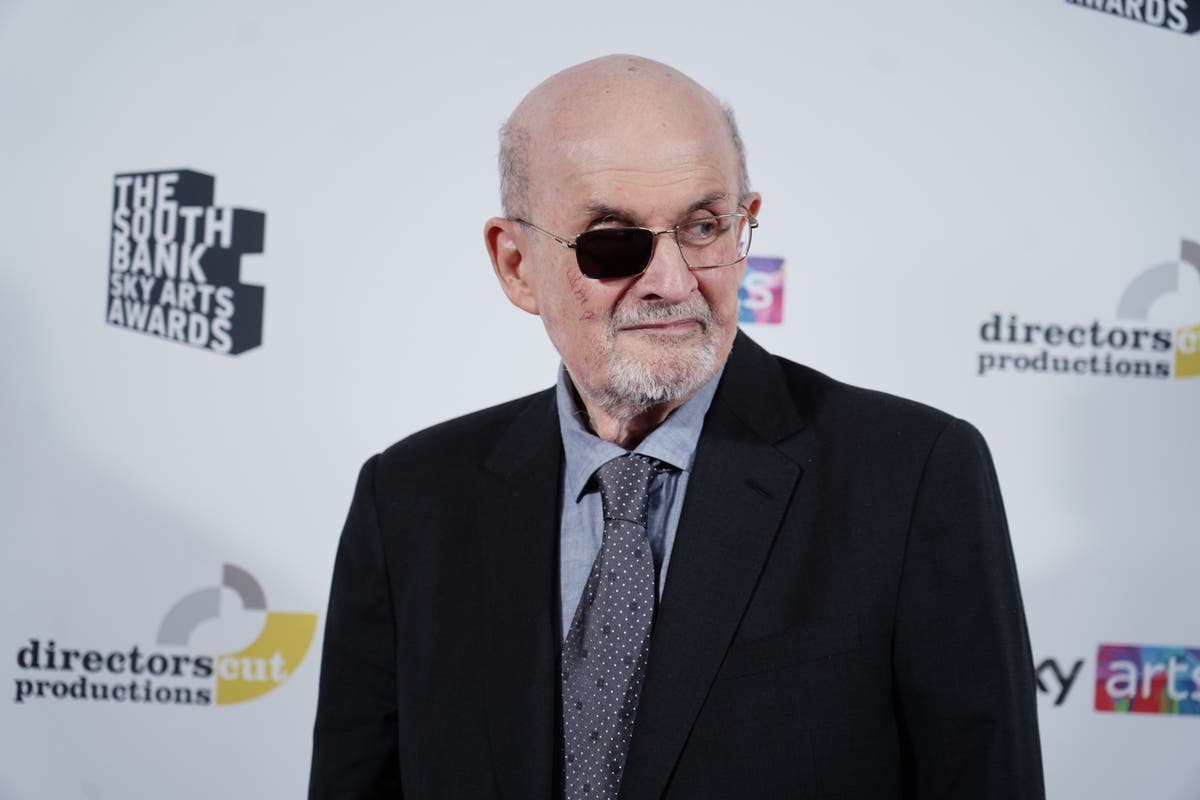Sir Salman Rushdie has laid bare his horror at lying in “a spectacular quantity of blood” after the frenzied on stage attack that very nearly claimed his life two years ago.
The British Indian author, 76, was stabbed “13 or 14 times” in August 2022 while preparing to deliver a lecture on free speech at the Chautauqua Institution in New York.
In a frank memoir, Rushdie recalls “this murderous shape rushing towards me”, a “murderous ghost from the past”, who would ultimately hospitalise him for six weeks, permanently damage his hand and blind him in one eye.
“I felt him hit me very hard on the right side of my jaw. He’s broken it, I remember thinking. All my teeth will fall out. At first I thought I’d just been hit by someone who really packed a punch”.
In the new novel, Rushdie describes how “blood began to pour out of my neck. I became aware, as I fell, of liquid splashing onto my shirt.
“There was the deep knife wound in my left hand, which severed all the tendons and most of the nerves. There were at least two more deep stab wounds in my neck—one slash right across it and more on the right side—and another farther up my face, also on the right.”
“I remember lying on the floor watching the pool of my blood spreading outward from my body. That’s a lot of blood, I thought. And then I thought: I’m dying,” he adds.
Rushdie also describes“the cruelest blow” – a knife in the eye.
“It was a deep wound. The blade went in all the way to the optic nerve, which meant there would be no possibility of saving the vision. It was gone. He was just stabbing wildly, stabbing and slashing, the knife flailing at me as if it had a life of its own, and I was falling backward, away from him, as he attacked; my left shoulder hit the ground hard as I fell”.
A 26-year-old New Jersey resident, Hadi Matar, was charged with the attack, which came three decades after the notorious 1989 fatwa issued by Ayatollah Ruhollah Khomeini following the release ofThe Satanic Verses.
Knife: Meditations After an Attempted Murder tries to make sense of those astonishingly violent 27 seconds.
The attack damaged his liver, hands, and severed nerves in his right eye, which was left “kind of hanging out of my face, sitting on my cheek, I’ve said like a soft-boiled egg. And blind”.
While he considers himself lucky to have avoided brain damage, it “upsets me every day,” he writes.
Rushdie reflects on having to take greater care when walking down stairs, crossing the road, or performing a simple task like pouring water into a glass.
In a startling revelation, the author also confesses to having dreamt of an attack just days before his attempted murder.
Thrashing around in a baying Roman colosseum frantically avoiding a man wielding a spear, Rushdie describes having a dream so vivid, his wife, the poet Rachel Eliza Griffiths, woke him and reassured him he was still safe in his bed.
“There was an audience roaring for blood. I was rolling about on the ground trying to allude a gladiator’s downward thrusts.
“I was quite shaken by it – and I said to Eliza, I don’t want to go. And then you wake up a bit more, and you think, it’s just a dream, and you’re not going to allow your life to be ruled by something that happened in a dream.
“And so I thought, ‘I’ll go. It’s a gig. Fifteen hundred people had bought tickets. I can’t just not show up because I had a bad dream,” he writes.
Matar has been held without bail since the attack, and said to officials previously, “I don’t like the person. I don’t think he’s a very good person. He’s someone who attacked Islam, he attacked their beliefs, the belief systems”.
Matar’s trial, which was supposed to begin in January, has been put on hold after his attorneys argued they needed to review Rushdie’s memoir, since it could be evidence.
In Knife, Rushdie addresses Matar, saying, “Our lives touched each other for an instant and then separated. Mine has improved since that day, by yours has deteriorated. You made a bad gamble. I was the one with the luck”.
Rushdie calls his memoir “at least as much a love story” as it is a story of a horrifying assault.
“There were two forces in collision here. One was a force of violence, fanaticism, bigotry, and the other was the force of love,” he said.
“And of course, the force of love is embodied in the figure of my wife Eliza”.
“And in the end, the way I understand what happened is that the force of love proved to be stronger than the forces of hatred”.








